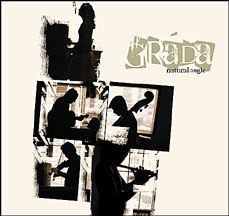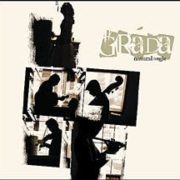GRADA – NATURAL ANGLE
ARTIST: GRADA
TITLE: NATURAL ANGLE
LABEL: COMPASS RECORDS
RELEASE DATE: JANUARY, 2010
 Two things hit me from the first, listening to Natural Angle, Grada’s latest release on Compass Records. First, this recording just sounds fantastic, and second, these great players have carved out a unique sound amidst the proliferation of fiddle/accordion/flute/guitar.female vocalist Irish bands now showcasing Irish music on the world’s stages. Grada’s music is rooted and strong, with a sense of humor and it is quite emotionally powerful without losing an truly engaging sense of spontaneity.
Two things hit me from the first, listening to Natural Angle, Grada’s latest release on Compass Records. First, this recording just sounds fantastic, and second, these great players have carved out a unique sound amidst the proliferation of fiddle/accordion/flute/guitar.female vocalist Irish bands now showcasing Irish music on the world’s stages. Grada’s music is rooted and strong, with a sense of humor and it is quite emotionally powerful without losing an truly engaging sense of spontaneity.
Abe’s Axe, a set that links a trad tune with one of the band’s own composition, leads with David Doocey’s lovely focused flying fiddle, then Stephen Doherty comes in with breathy percussive effects on flute that work perfectly, all respect to Jethro Tull, before joining the fiddle in a duet that sounds both traditional and fresh, and, as in the best trad duets, more than the sum of two very good parts.
What I like about this band and this recording is that rather than sounding like a trad band with jazz and rock influences thrown in, or a folkrock band with a trad sound, they sound like musicians who have deep roots in real Irish music, as well as a love for other genres. This gives the music an organic feeling of coherence, in the same way that the best traditional artists have always incorporated what they heard and liked into their music.
The American influences are many and to my ear, always beneficial. Producer Tim O’Brien, himself a fan of Irish music, adds his instrumental chops in ways that seem more like the subtle spice that makes the dish rather than the obligatory “let’s add some bluegrassy stuff to be hip.” His song, John Riley, about the San Patricio brigade of Irishmen who deserted the U.S. Army to fight on the side of the Mexicans in the Mexican American war, is emotional without being maudlin, and the arrangement is creative, driving and completely enjoyable. Pretty Polly is another old American song, here in an unusual setting which the band plays sparely, with a growing momentum and a delicious sense of dread. Their take on the Mississippi John Hurt song, Louis Collins, is a great example of Grada’s perfect blending of styles. O’Brien’s clawhammer banjo is like a river upon which the vocals float like an ornate yet sturdy paddlewheeler, and the fiddle and flute breaks sound like Irish music looking to take root in New Orleans. I love Nicola Joyce’s singing. She has a killer voice and knows how to use it. I like all the vocals on this recording. The band sounds like they enjoy singing together, and their blend is very nice. O’Brien’s backup vocals are a treat.
The band’s composition Line and Lace is hypnotically lyrical, with Nicola’s voice drawing the listener in in a beguiling, more typically Irish way. Yet the arrangement sounds very new.
Again, on the Hutt Reels Doherty shows his ability to shift from a breathy percussive flute voice, to a rich trad tone, and back again, all in the service of the tune. Very cool. Another set of kicking good tunes, Dotsy’s are played with juice and style. The Salthill Bugalu sounded to me like proof that this band really likes to play together – a fun romp that could have almost been improvised, except that it is so tight.
A great recording altogether. It has great vibe and a rich sense of playfulness, but with real Irish fire and instrumental firepower, killer singing, and really musical inventive arrangements.
Kevin Carr has a touch of musical attention deficit disorder; he plays with Wake the Dead (Celtic Grateful Dead folk orchestra), Hillbillies from Mars (folk fusion dance band with roots that show), Les Tetes de Violon (Quebecois fiddle band), Charanga (Galician style big band) and Confluence (Irish and Original, with a full complement of family members). He also maintains and plays a large stable of bagpipes.













